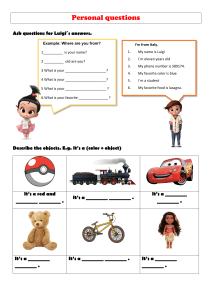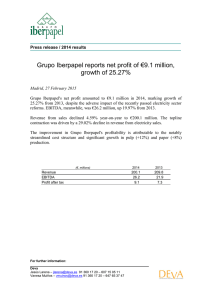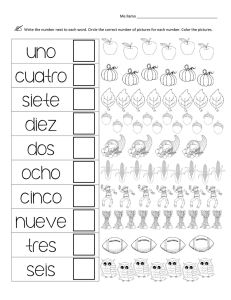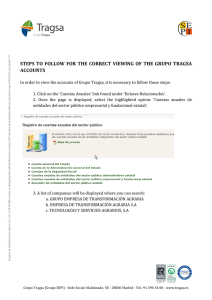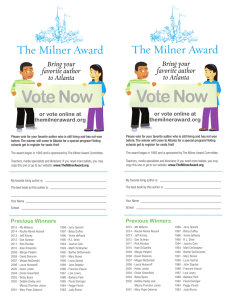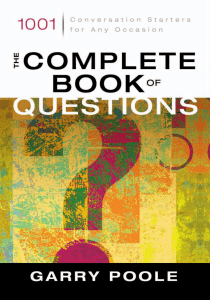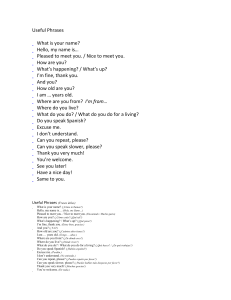activador cognitivo acceso a la informacion
Anuncio
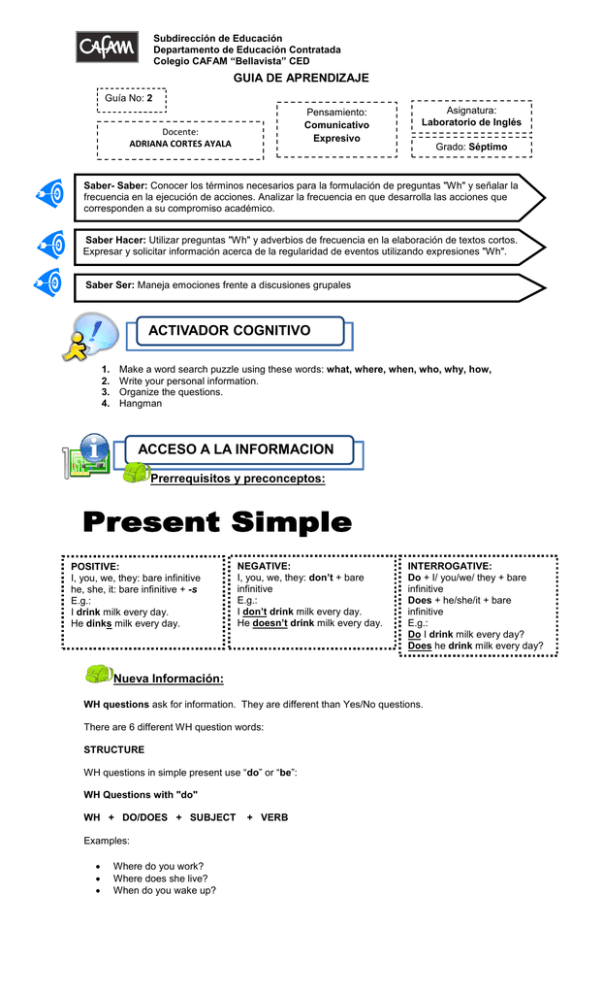
Subdirección de Educación Departamento de Educación Contratada Colegio CAFAM “Bellavista” CED GUIA DE APRENDIZAJE Guía No: 2 Pensamiento: Comunicativo Expresivo Docente: ADRIANA CORTES AYALA Asignatura: Laboratorio de Inglés Grado: Séptimo Saber- Saber: Conocer los términos necesarios para la formulación de preguntas "Wh" y señalar la frecuencia en la ejecución de acciones. Analizar la frecuencia en que desarrolla las acciones que corresponden a su compromiso académico. Saber Hacer: Utilizar preguntas "Wh" y adverbios de frecuencia en la elaboración de textos cortos. Expresar y solicitar información acerca de la regularidad de eventos utilizando expresiones "Wh". Saber Ser: Maneja emociones frente a discusiones grupales ACTIVADOR COGNITIVO 1. 2. 3. 4. Make a word search puzzle using these words: what, where, when, who, why, how, Write your personal information. Organize the questions. Hangman ACCESO A LA INFORMACION Prerrequisitos y preconceptos: POSITIVE: I, you, we, they: bare infinitive he, she, it: bare infinitive + -s E.g.: I drink milk every day. He dinks milk every day. NEGATIVE: I, you, we, they: don’t + bare infinitive E.g.: I don’t drink milk every day. He doesn’t drink milk every day. INTERROGATIVE: Do + I/ you/we/ they + bare infinitive Does + he/she/it + bare infinitive E.g.: Do I drink milk every day? Does he drink milk every day? Nueva Información: WH questions ask for information. They are different than Yes/No questions. There are 6 different WH question words: STRUCTURE WH questions in simple present use “do” or “be”: WH Questions with "do" WH + DO/DOES + SUBJECT Examples: Where do you work? Where does she live? When do you wake up? + VERB WH Questions with "be" WH + BE + SUBJECT Examples: Where are you from? Who is that man? When is your class? WH Questions are similar to YES/NO questions except they have WH words at the start. Examples: Are you from Canada? Where are you from? Here are some example questions and answers: Where are you from? I am from Japan. What is your name? My name is Jacob. When do you wake up? I wake up at 7:30 am. Why are you angry? I am angry because I did not pass my exam. Adverbs of Frequency are used to say how often we do something. Example: We always go swimming in summer. 1) 2) 3) 4) 5) 6) Some Adverbs of Frequency are the following: always usually often sometimes rarely / never never The Adverbs of Frequency are placed in a sentence as follows: After Auxiliary verbs (be, don’t etc.) Examples: He is always late. I don’t usually believe him. Before Main Verbs Example: He sometimes goes fishing. Be careful of Short Answers Example: Does the dog often bite? Yes, it often does. Is he always so moody? No, he sometimes is. Integración: 1. Complete with question words: (what, where, why, what time, how, when) ________ do you pronounce “September”? _________ newspaper do you read? _________ were you born? In London. _________ were you born? In 1998. _________ does she live? In Paris. 2. Make a correct question 1. what time / you / go to bed / usually……………………………………………………………………? 2. what / you / do / now………………………………………………………………….…………………? 3. your father / have / black hair…………………………………………………………………..………? 4. what / you / do / yesterday evening……………………………………………………………………? 5. what / you / do / after class……………………………………………………..………………………? 6. your mother / strict………………………………………………………………………………………? 7. you / ever / be bitten by a dog………………………………………………….………………………? 8. what / you / do / yesterday at 7 PM……………………………………………………………………? 9. rain / tomorrow………………………………………………………………………………………..…? 10. how many / people / in your family……………………………………………………………………? 11. you / like / Korean pop music………………………………………………………………………..…? 12. who / favourite actor………………………………………………………………………………….…? 13. how much / a Big Mac…………………………………………………………………………..………? 3. Complete with a WH word: where, why, when, who, how, what, whose 1.- ………. isn’t Jenny at school? Because she’s ill. 2.-…..…. often do you go to the gym? Twice a week. 3.-……… old is your grandmother? She’s 68 4.-……….. are my new shoes? In the wardrobe. 5.-…..…. is your teacher doing? She’s reading. st 6.-…….. does Winter start? On 21 December. 7.-……… does your mother do? She’s a nurse. 8.-……….. far is the city centre? Only 100 metres. 9.-………. time do you usually go to bed? At 9,30 10.-…….. are the children doing? They are playing. 11.-……. much is a kilo of apples? 2,50€ 12.-………. many hours do you study a day? 3 hours. 13.-………..does Sonia go to work? On foot. 14.-………… do you never go on Sunday? To school. 15.-……….. are the kids shouting? Because they’re happy. 16.- ……….. money have you got in your pocket? Nothing. 17.- ……….. does your uncle Paul live? In Barcelona. 18.- ……… do you buy clothes? At the end of the month. 19.-……… long does it take you to go to work? 15 minutes 20.- ………. teachers Maths at the school.? Mrs Smith. 21.- ,……… did you fail the exam? Because I didn’t study. 22.-……….many coins have you got? Ten coins. 23.- ……… did you invite to the party? All my friends. 24.- ……… did you switched off the TV? It was boring. 4. Put the words in the correct order to make complete sentences. 1. Eat / Lunch / Always / We / At / Cafeteria / The _____________________________________________________ 2. At 8.00 / Sue / gets up / usually. _____________________________________________________ 3. Brother / Fooling Around / My / Constantly / Is _____________________________________________________ 4. Very amusing / This / is / Generally / Show _____________________________________________________ 5. Hardly ever / Lucas / Sick / Gets _____________________________________________________ 6. Regularly / You /Gym / Go / ? / Do / The / To _____________________________________________________ 7. Doesn’t / Bark / The / Normally / Dog _____________________________________________________ 8. He / Is / Frequently / ? / Late _____________________________________________________ 9. Never / Rude / Is / Lucy _____________________________________________________ 10. Go / To / Occasionally / My / The / Parents / Theatre _____________________________________________________. 5. Choose the correct answer. 1) 2) 3) 4) 5) 6) 7) 8) 9) 10) 11) 12) 13) The lions ------------------------------( always-eat ) meat. Su -------------------------------------( never-make ) mistakes. My father ------------------------------( sometimes-help ) my mother. Our dog --------------------------------( never-bark ) at night. The flowers ----------------------------( always-need ) to be watered. Can -----------------------------------( rarely-go ) fishing at the weekends. The students ------------------------( sometimes-be ) late for the school. My teacher ---------------------------( never-shout) at us. Tom ------------------------------often-go ) out with his friends at nights. Julia -------------------------------( usually-do ) her homework after dinner. ----- you -------------------------- ( often-read ) books? The doctors ---------------------------( always-help ) sick people. My mother ------------------------------( sometimes-go ) shopping with my aunt. ACCESO AAPLICACIÓN LA INFORMACION Recordación: Affirmative and negative form I go You do He drives She cooks It eats We help You kiss They walk do not go (don’t) don’t do does not drive (doesn’t) doesn’t cook doesn’t eat don’t help don’t kiss don’t walk Question form: Do I get up so early? Yes, I do. /No, I don’t. Does she cook every evening? Yes, she does. /No, she doesn’t. Do they go on holiday? Yes, they do./ No, they don’t. Refinamiento: 1. Answer the following questions 1. How are you? 2. What’s your name? 3. Where do you live? 4. How old are you? 5. What’s your favorite color? 6. What are your hobbies? 7. What fruits do you like? 8. How many brothers and sisters do you have? 9. What’s your nationality? 10. Where are you from? 11. Who’s your favorite actor/actress? 12. What’s your favorite TV program? 13. What’s your favorite sport? 14. What’s your favorite movie? 15. Who’s your favorite singer? 16. What’s your talent? 17. What’s your favorite kind of music? 18. What food do you like? 19. When is your birthday? 20. What’s your favorite animal? 21. What’s your mother’s name? 22. What’s your father’s name? 23. What’s your favorite channel? 24. Who’s your best friend? 25. What’s your phone number? 26. What subjects do you like? 27. What’s your nickname? 28. What’s your school name? 29. What’s your favorite day of the week? 30. What’s your favorite song? 2. Read and circle 3. Write sentences using: **** *** ** * ALWAYS OFTEN SOMETIMES NEVER Example: I / do / my homework / ** I sometimes do my homework 1. He / eat / bananas / * ………………...…………………………………………………………………… 2. She / drink / milk / *** ……………………………………………………………………………………… 3. I / brush / my teeth / **** ……………………………………………………………………………………… 4. You / read / comics / *** ………….....……………………………………………………………………… 5. We / make / cakes / * ………………………………………....………………………………………… 6. She / go / to school / in the morning / **** …………………………………….……………………………………………………. 7. They / watch / the news / ** …………………………………………………………………………………………… 8. I / play / basketball / at school / * ……………………………………………………………………………………………. 9. He / play / the violin / in the afternoon / ** ………………………………………………………………………………………….. 10. You / go / to the cinema / on Saturday / **** .............................................................................................................................. Trabajo individual: 1. Create an interview to a famous person using the wh questions. 2. Make a poster with images about the activities that you never, often, usually, sometimes and always do. Construcción en pequeño grupo: 1. Make a domino in small group with wh questions and answers. 2. Make a list of how often questions ACCESORECAPITULACIÓN A LA INFORMACION Socialización al Gran Grupo: 1. 2. Cada grupo muestra el domino al curso. Cada grupo pasa a los demás grupos sus preguntas para que las respondan. Verificación: Teniendo en cuenta el desarrollo del trabajo individual y el realizado en pequeño grupo se evaluaran los siguientes aspectos: 1. La actitud al momento de desarrollar el trabajo individual y en pequeño grupo. 2. La creatividad en la utilización diferentes herramientas pedagógicas y actividades a nivel individual-grupal. 3. El desempeño de cada rol en su pequeño grupo. 4. El producto final expuesto en clase. Reflexión: Los estudiantes evaluaran su proceso de aprendizaje durante el periodo basados en los siguientes aspectos. 1. 2. 3. 4. 5. DESEMPEÑOS Identifico diferentes preguntas WH Reconozco los adverbios de frecuencia. Realizo diferentes ejercicios para aplicar lo aprendido. Elaboro una entrevista usando las preguntas WH Elaboro en pequeño grupo un domino usando las preguntas WH 1 2 3 La guía debe ser desarrollada en su totalidad en el aula de clases. El tiempo estimado para la solución de la guía corresponde a 10 unidades didácticas. Regulación: 4 5
